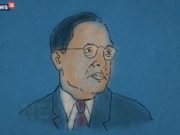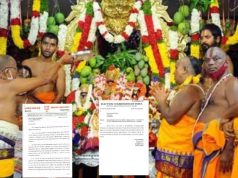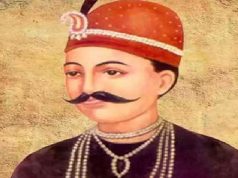
We must face the hard fact that our western neighbour, equipped with nuclear weapons, is only waiting to unload them on our territory in fulfilment of its self-imposed historic role of Islamising India
Only the uninitiated and gulible would have been shocked following a Pakistan Court order last Thursday, directing the Government not to ‘harass’ Lashkar-e-Tayyeba (LeT) founder Hafiz Saeed and to allow him to continue his “social welfare activities”. Ironically, the court’s order came just three days after the US declared the Milli Muslim League (MML), the political party formed by Saeed, as a foreign terrorist organisation.
Saeed, whose ‘social welfare activities’ won the approval of Justice Ameenuddin Khan of Lahore High Court, is the king-pin of the terror machine in the sub-continent. He is the co-founder of LeT and chief of the Jamaat-ud-Dawa’ah (JuD).
Saeed, a popular figure in Pakistan, claims inspiration from Islam and frequently targets India and rest of the non-Islamic world in his public speeches. He is quoted as saying, “There cannot be any peace while India remains intact. Cut them, cut them so much that they kneel before you and ask for mercy”.
Speaking on the issue of arrest of separatist Kashmiri leader Masarat Alam Bhat by the Jammu & Kashmir Government, Saeed said, “Jihad is the duty of an Islamic Government… there is a Government in Pakistan and it has always taken the stand that it is the right of Kashmiris to attain freedom. I say what our Army will do to secure the right of the Kashmiris , its Jihad… We extend help to Kashmiris alongside the Government … we call this Jihad.”
In April 2012, the United States announced a bounty of $10 million on Saeed for his alleged role in the 2008 Mumbai terror attacks in which 164 civilians were killed, including six Americans.
Apart from the United States, the United Kingdom, the European Union, Russia and Australia too have banned LeT. Saeed is listed on the National Investigation Agency’s (NIA) most wanted list for his alleged involvement in numerous terror-related incidents in India in the recent past.
For those who have been seeking to make sense out of Pakistan’s slide towards internal chaos, external isolation and consequent rooting for close support from whichever quarter it can come, former diplomat and author Husain Haqqani’s most recent book, Reimagining Pakistan: Transforming a Dysfunctional Nuclear State, may be helpful.
Haqqani is not a hack. He has known his former establishment from close quarters as he was Islamabad’s Ambassador to the United States. He is an intellectual of great standing having earlier penned a much quoted and true picture of his country in his book, Pakistan: Between Mosque and Military.
Haqqani’s analysis of Pakistan’s 70-year history brings out just three instances wherein the Government held strongly to pressures from the clerics to act as executors of the law of the land and not take diktat from the clerics.
Haqqani lists these three occasions when the political establishment asserted its right over the system that it lets religious sentiment prevail over lawful interpretation. It occurred in 1953 when the clerics whipped up public sentiment against Islamic sects that differed from majority understanding of what the religion is. The then Prime Minister Khawaja Nazimuddin refused to yield to the cleric’s demand that Foreign Minister be removed as not being Islamic enough.
The Prime Minister with the support of the Army and the judiciary quelled the consequent riots in Lahore. The principle that law should not be what the rioters say it is but what is derived from the Constitution and interpreted by duly constituted authority like the judges was established.
More recently, the state also asserted that the law is what the court says it is when the Government refused to let the bylanes of Lahore commute the death sentence of the Governor’s guard Mumtaz Qadri who had shot at him for his liberal views.
But for all these isolated bright spots, for Pakistan as a state that goes by the rule of law, the record has been quite different. Today we see reports of Islamic sections bombing and killing worship places of rival Muslim sections, each claiming to be the only true Muslim. No wonder the likes of Hafiz Saeed call the shots .
Haqqani traces this rot to General Zia who had set Islamisation as the ideology of Pakistan. “If Islam is not central to Pakistan, we might as well have stayed with India” this was General Zia’s oft quoted justification.
But it was this path that was to take Pakistan to the brink. As Haqqani puts it: Islamisation enabled the clerics to be first allies and then masters of the show. The Army officers were made to absorb and then consider their duty to receive the final wisdom not from the written Constitution but from Islam .
That explains why occasional candle lighting and exchange of old world memories on specific days between a very small minority in both India and Pakistan never goes down with the people of both countries.
In Haqqani’s words: “Accepting that Pakistan is a newly conceived nation state that would create history as it goes forward…” but that is not the way it was marketed by its leaders. History books for school students in Pakistan indoctrinate them against all non-Muslims, especially Hindus and India.
Haqqani said, “Successive Pakistani leaders and most of the country’s intelligentsia preferred to build the ‘ideology of Pakistan’ on the twin pillars of Islam and antagonism towards India”. Once that was done, Pakistan can see itself only as destined by its version of history with god given responsibly of conquering residual India for Islam.
Here lies the justification among the people of that country to the wanton killings, murders, sabotage and even nuclear weapons aimed at India. The originator of the November events in Mumbai in 2008, Saeed, may be a terrorist for India and the rest of the world but he moves around in Pakistani streets as a hero.
Pakistan has resisted the United States and also international pressure to bring him to trial even to the extent of hanging on the coat tails of President Xi Jinping of China, virtually surrendering its sovereignty over swathes of its territory because that is the only large country that supports protection to the terrorism leader.
We are out to face the fact that our Western neighbour, equipped with nuclear weapons, is only waiting to unload them on our territory in fulfilment of its self-imposed historic role of Islamising India. In fact, the US is unwillingly succumbing to Pakistani blackmail for fear these weapons will fall into the hands of likes of Saeed. Haqqani’s conclusion is, to say the least, blunt: “Pakistanis have proven to be their worst enemies.” But that is no comfort to us.
By Balbir Punj
(The writer is a political commentator and a former BJP Rajya Sabha MP)
Courtesy: The Pioneer












